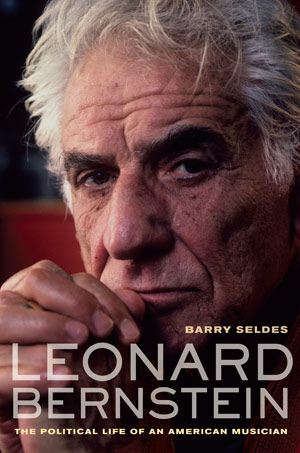
I want my readers to understand Leonard Bernstein as a person whose political life was intimately bound up with his artistic life.
I was inspired to begin writing this book in 1995, when the FBI’s dossier on Bernstein became accessible under the Freedom of Information Act. To that date, only about five of this dossier’s many hundreds of pages had been published or made use of by biographers. Using these materials in conjunction with Bernstein’s correspondence and other papers that became available at the Library of Congress in Washington, D.C., I have written an account of Bernstein’s life that deepens considerably our understanding of this iconic figure.
I set out to document Bernstein’s extraordinary engagement with leftwing politics to a degree far surpassing what other biographers have covered. I go on to document, among others, his tribulations during the 1940s and 1950s blacklist era; his recuperation via the so-called Cultural Cold War; his ascension to the musical directorship of the New York Philharmonic; his political work in the anti-Vietnam War, civil rights, and gay rights movements; his political and social philosophy. I then explain how all of these found connection, if not expression, in Bernstein’s compositions, and in his championing of the works of Gustav Mahler.
Focusing on interconnections between politics and culture, I try to indicate why Bernstein, up to his dying day, remained frustrated in his hopes to compose a work of great political significance.
“In the last decades of his life, Bernstein hoped to compose a work of operatic or hybrid form that would bring his fellow citizens back to the ethical-political outlook that they professed in the abstract but against which they acted in concrete situations.”
My interests in cultural politics include a project I had started before the Bernstein project—a study of the joint work by the Soviet artists Vladimir Mayakovsky and El Lissitzky, their 1923 book, For the Voice. My emphasis here was especially on Lissitzky’s design for Mayakovsky’s poem, “And You?”
Radically different as the Bernstein work is from this earlier project, both projects trace how the work and sensibilities of creative artists are composed and conditioned by cultural and political milieu.
In my book, I also refer to Bernstein’s contemporaries in theater and fiction—e.g., Saul Bellow, Aaron Copland, Arthur Miller, Norman Mailer. The idea was to understand how that generation acted within their situation. Of course, the sensibilities of these artists are not reducible to that situation: each one was carrying out his own project.
To understand Bernstein’s project, I went back into his formative years at Harvard. Bernstein met with, among others, Copland, Serge Koussevitzky, Mark Blitzstein. He later collaborated with Jerome Robbins and with Lillian Hellman, and, in the early period leading up to his Mass, with Daniel Berrigan. In all these endeavors, Bernstein was composing works that responded to the political and moral climate. In the last decades of his life, Bernstein hoped to compose a work of operatic or hybrid form that would bring his fellow citizens back to the ethical-political outlook that they professed in the abstract but against which they acted in concrete situations.
In short, Bernstein sought for a form of art in which to indicate his countrymen’s bad faith.
I wrote the Introduction as a mise en scène that would set the stage for what comes next—a tale of presidential betrayal of an American artist (by Truman and Eisenhower). In a larger sense, my work indicates how the arts are not separated from the domestic and international political milieus, from political and social forces. In other words, the aesthetic terrain is not in some pristine place but is instead linked to structures of power.
I think that my book makes much of this clear by focusing not on abstract theory but on the concrete, human case. Leonard Bernstein was, of course, a composer and conductor living in Cold War America. As composer of Broadway musical theater, he was subject to the demands of the Cold War culture industry for creative expression. Dissident and daring, Bernstein tested the limits imposed by orthodoxy—e.g., by naming and opposing the military-industrial complex and its adventures and expeditions around the globe. But Bernstein did not broach those limits.
In the sixties and later on, Bernstein did attack that complex, its promotion of an expansionist foreign policy and its most visible manifestation, the war in Vietnam. And Bernstein did not stop there: he also attacked racism and homophobia, in the 1977 Songfest and in public address.
The reader will learn from the section on Gustav Mahler how Bernstein’s championing of that composer fits into the socio-political analyses of Bernstein’s life-long projects.
“Social forces condition individual thinking and acting, and thereby constitute our very beings.”
I want to see this book as making a contribution not only to our understanding of Leonard Bernstein, but to see in him a case in the larger study of the confluences and transactions between the arts and the forces that govern the social order.
There are a number of such studies, e.g., on Dimitri Shostakovich, on Aaron Copland, and another, forthcoming, on Bernstein’s theatrical works by a politically-informed musicologist.
I’d like to see other such studies that will indicate the relative porosity or supposed impregnability of the boundaries that nominally separate the aesthetic from the socio-political realms. Such understanding will illuminate the ways in which social forces condition individual thinking and acting, and thereby constitute our very beings.


Barry Seldes is professor of political science and American Studies at Rider University, where he has taught for four decades. He has published and lectured widely on topics of politics and culture, with foci on music and cinema. He is currently writing a book on the late critic Susan Sontag.